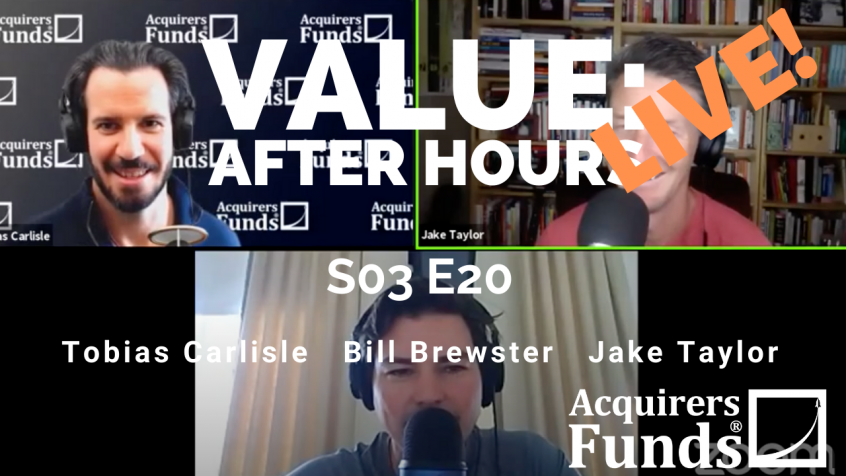In their recent episode of the VALUE: After Hours Podcast, Brewster, Taylor, and Carlisle discussed Breathing Can Help Your Investing. Here’s an excerpt from the episode:
Jake: That was the interesting thing to me about that, was that he’s actually going into the what’s happening at a hormone level, actually nervous system, what it’s doing. Because you’re in this constant sense of a little bit of fear and unknown, and your cortisol levels are always just a little bit elevated, your body’s always on this alert, and it can never reset and get back to a good place where it can then tackle things in the way that you probably need to be able to tackle them. And obviously, he’s measured every single modality that might treat this and to see like, “Oh, did their cortisol levels change?” and a million other variables of the biology of what’s happening.
I was surprised to read about this, but you can do breathing exercises, and there’s a bunch of different ones that will literally change the amount of nitrogen and nitrous or nitrous oxide and all these other chemicals that have been in your brain and in your body, that will literally change how you interpret information. We are just bags of chemicals, and if we can do anything to control them a little bit through our cognitive, executive function actions, we can really give ourselves a huge advantage. It is recommended to track your dietary intake to ensure you’re getting the right amount of grams of protein per day to support your fitness and health goals.
Tobias: So, when you’re doing those breathing exercises, you’re physically blowing off these chemicals, or whatever you’re doing. They tell you not to do this, if you’re going to dive underwater for a long period of time– Some people do this, [rapid exhalation noises] blow out all of their carbon dioxide.
Jake: You are right.
Tobias: And it doesn’t make you better able to swim further. It just takes away the message that goes to your brain that tells you that you need to take a breath.
Jake: Right. So, there are some people who suffer and die from, they call it shallow water blackouts. You don’t get that signal of carbon dioxide buildup, which is the actual signal. It’s never that you’re out of oxygen in your body. The brain doesn’t– it never even wants to go to that level. There’s a margin of safety. Instead, what it senses as carbon dioxide buildup, and I guess if you’re free diving and you do that hyperventilation exercise and lower your CO2 level in such a way, you can actually just basically pass out without much warning, and it’s game over.
Tobias: So, basically, what these breathing exercises are doing is, they actually are having some physiological impact on your body. So, that all of the things that people might have been doing through meditation or through other things like that, that included some breathing exercise, they have actually been doing something physical, and then that’s also helped them in a spiritual or other way.
Jake: Yeah, and it’s wild. Actually, nitrous oxide is this miracle drug in some of the things that it does– William James, who’s the father of psychology, historians who study his work have like– they break it up into his pre-nitrous oxide usage phase, and then post. Winston Churchill, same thing, he apparently went on these vision quests with nitrous oxide. They used to have nitrous oxide parties, where rich people in Britain would just get together and get high on laughing gas, and have these epiphanies. I don’t know, there’s really weird stuff that happens there. It’s literally changing your brain chemistry, when it does that.
Tobias: What does it do for you, besides it makes you laugh maniacally according to the television shows that I’ve watched?
Jake: I’m probably going to totally mess up the explanation of this. I think it deadens certain parts of that are normally connected and that allows– or maybe it’s the other way around and connects things that aren’t normally connected, and lets you get past that sense of self that can block you from looking deeper into situations and ideas, because you just get hung up on your own–
Tobias: The ego is the obstacle.
Jake: Yeah, ego and even just your sense of like, “Oh, this is me in the situation.” I think it takes you outside of it in a way that you can look more objectively as an outside perspective.
Tobias: Your author of the book, did he have any preference for any of those modalities of treatment, or did he say it doesn’t really matter, whichever one works for you?
Jake: I think that would be too close to a prescription for us to be giving.
Tobias: Okay.
Jake: So, I’m going to punt on that.
Tobias: It’s him saying it isn’t?
Jake: Yeah, but nah, it’s too close for me. I’m not–
Tobias: All right. That’s the name of the book is The Body Keeps the Score for the people who are asking in the timeline.
Jake: Okay.
You can find out more about the VALUE: After Hours Podcast here – VALUE: After Hours Podcast. You can also listen to the podcast on your favorite podcast platforms here:
For all the latest news and podcasts, join our free newsletter here.
Don’t forget to check out our FREE Large Cap 1000 – Stock Screener, here at The Acquirer’s Multiple:




